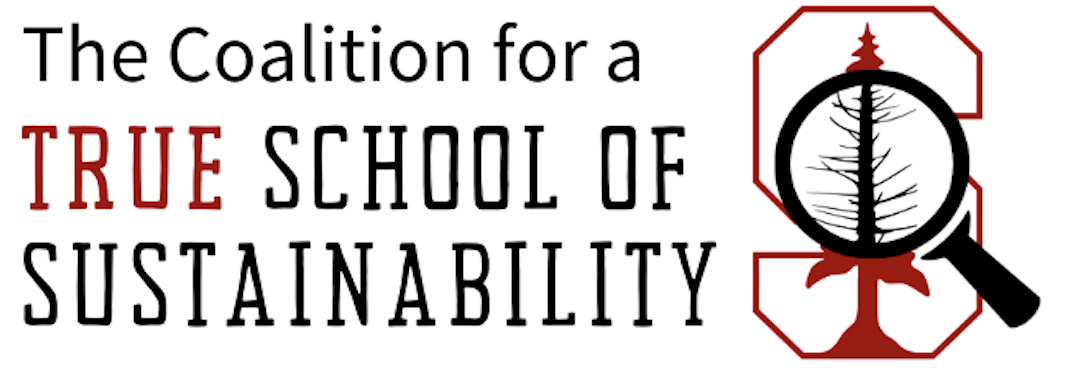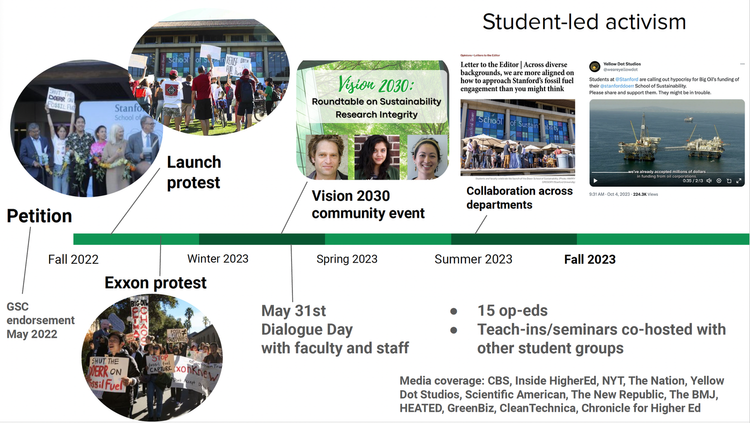A Two-Year Rundown of Wins
May 14, 2024
Dear Coalition Supporters,
It has been two years since a group of us formed the Coalition for a True School of Sustainability and began organizing to kick big oil out of the Doerr School of “Sustainability.” It has been a tiring and frustrating fight. Institutional change is slow, and school administrators don’t tell you “you’re winning.” You have to observe the changes yourself.
However, our scrappy group has accomplished a lot and we thought it high time we provided a rundown of our actions, our wins, and a measurement of our growing power.
Bolded lines indicate Stanford’s institutional responses to our actions.
Timeline since May 2022 at Stanford:
May 4th 2022 — Dean Arun Majumdar tells the New York Times that the Doerr School is open to accepting fossil fuel money
Spring 2022
WhatsApp group of outraged students forms, starts planning, and gathers data on the Doerr School’s fossil fuel entanglements
An open letter calling for dissociation from fossil fuel companies is publishedin the Stanford Daily. It has garnered over 800 Stanford affiliate signatures including over 100 faculty. We continue with numerous op-eds throughout the spring, mostly in the Daily and including one in The Nation.
We launch our website.
Summer 2022
The Doerr School’s fossil fuel ties are called out in GreenBiz and CleanTechnica, citing our stories in the Stanford Daily. An ‘investigation’ piece in the British Medical Journal draws parallels between the Doerr School and universities that took tobacco money.
Fall 2022
We protest the Doerr School launch, drawing over 150 students, faculty, and staff. The same day, Princeton announces it will dissociate from over 90 fossil fuel companies, further adding pressure.
World-renowned historian Naomi Oreskes, recipient of Stanford’s 2021 Distinguished Alumni award, turns down an invitation to speak at the Doerr School opening because of its fossil funding. She writes an op-ed about it in Scientific American and speaks at our event instead (co-sponsored with Scientists Speak Up). Our event draws over 150 participants.
The Doerr School lets Darren Woods, the CEO of ExxonMobil, publicly speak at its semiannual “Global Energy Forum.” Other speakers include Senator Joe Manchin and executives from Shell and Total. We protest the event (see coverage in the Daily) and dye Tanner Fountain black.
Thanks to our efforts, no fossil fuel executive has publicly spoken at the Doerr School since. Let’s keep it that way.
John Doerr is quoted in a tweet saying the Doerr school may yet change its stance with enough student/faculty pressure https://twitter.com/brittwray/status/1580309285988315136
The Doerr School’s fossil fuel entanglements — and our efforts to dissociate — get increasing attention, appearing in the New Republic, the Chronicle of Higher Education, and Inside Higher Ed. We score a Correspondence pieceon fossil funding in the journal Nature.
Chevron branding is removed from Precourt’s Energy Seminar series webpage and email updates.
Many fossil-funded affiliate programs begin obfuscating their research descriptions with jargon and green buzzwords. We highlight an example here.
Fossil fuel funding becomes a regular feature of Dean Majumdar’s communications. The Office of the President creates a committee to review fossil fuel funding and produce recommendations. Two years on and the committee has produced nothing, but its creation clearly means:
We officially become a PR headache
Winter & Spring 2023
With cautious (and unfounded) optimism that the Presidential Committee (aka CFERE) would be productive, we take a pause from louder protests and pivot to educating the Stanford community.
Alongside Scientists Speak Up, we host a talk by David Fenton on fossil fuel greenwashing and brainwashing and one by Stanford Prof. Jef Caers on his journey from collaborating with 36 oil and gas companies to cutting all his fossil fuel ties and launching the Doerr School’s first fossil-free affiliate program (see coverage in The Daily). One of our members appears on climate YouTuber Simon Clark’s channel (500k+ subscribers) to discuss dissociation and the Doerr School’s fossil fuel ties.
We host a mini-symposium featuring prominent journalists, scientists and scientist-activists, and students to discuss fossil fuel funding and follow it up with a panel and town hall discussion on what the future of the Doerr School should be. Dean Arun Majumdar attends. See coverage in The Daily.
We publish a brief outlining concrete dissociation demands and the research that underpins them.
The Guardian reports on Stanford’s fossil funding numbers.
The Doerr School’s first “flagship destination” is announced to be greenhouse gas removal. Thanks in part to our intel, the Chronicle of Higher Ed reports that fossil fuel executives helped to shape this decision.
Dean Arun Majumdar responds defensively to the Chronicle’s reporting in a Stanford Daily article, in which he says our criticism of fossil fuel funding has “become a DEI issue.” His response is derided on “Climate Twitter.” The climate community’s critical spotlight on the Doerr School shines brighter.
One of our members speaks to CBS about the Doerr School’s fossil entanglements. Many of our members are featured.
Several Dutch Universities include the University of Amsterdam, Vrije Universiteit, and the University of Utrecht all announce partial or full dissociation from fossil fuel companies. Read more here.
Two separate oily events, a refinery tour by Chevron and an info session with Shell, are abruptly cancelled within days of our members signing up to attend.
At a spring faculty meeting, Stanford’s external relations spokesman says that fossil funding is a major problem and that donors believe Stanford is too industry-friendly.
The Presidential Committee (CFERE) hosts a “Town Hall” meeting bringing together many students and faculty. There is productive discussion, but no follow-through and no recommendations are produced.
All of this adds up to:
We make campus increasingly hostile to fossil fuel companies
Summer 2023
We begin sending out regular deep-dives into Stanford’s fossil fuel entanglements including the Natural Gas Initiative, the Hydrogen Initiative, and the Energy Modeling Forum. Many are archived here. Our newsletters and deep-dives are consistently opened by at least 350 people. These include Stanford affiliates, outside climate disinformation scholars, and journalists. Engagement with our links is high, which suggests people are actually reading them.
Fall 2023
Don’t Look Up director Adam McKay releases a satirical ad for the Doerr School. It receives over 250,000 views on Twitter and is retweeted by Bill McKibben. It’s picked up by KQED, who interviews two of our members.
Three of us join forces with three students who object to our calls for an outright ban on fossil fuel funding. We find common ground and publish our recommended association and dissociation criteria. The six of us begin scoring regular meetings with Dean Majumdar. High-ranking faculty who were previously silent on the Coalition’s brief now endorse these “bipartisan” recommendations to their colleagues.
An international collaboration of campus fossil fuel dissociation and divestment movements brands itself the Campus Climate Network, hires full-time staff, and goes on a growth tear. Its member orgs notch major wins, including forcing Harvard Prof. Jody Freeman to resign her $350,000 per year seat on the board of ConocoPhillips.
Innovation Day, an event that featured a speaker from Shell in 2022, is postponed — first until the spring and then to fall 2024.
Alongside Scientists Speak Up, we host a talk by Harvard Prof. Viktoria Cologna on how scientists-activists are perceived and a talk by MIT Prof. Charles Harvey on how industry-funded academic studies on Carbon Capture and Sequestration (CCS) are lending credibility to this dead-end technology. A similar version of his talk is available here.
Dean Arun Majumdar references our recommendations in an open letterand promises action on funding transparency. His public rhetoric has shifted markedly in our favor.
Chevron and Shell are absent from the fall career fair after attending for years.
Dean Majumdar follows through and releases a set of Industrial Affiliate program funding information on the Doerr School website. Now prospective graduate students will have a better sense whether their education will be funded by oil and gas money.
We’re getting some institutional movement!
Winter and Spring 2024
Inspired by the Doerr School Department of Energy Science Engineering’s choice to host a former Shell Nigeria lawyer for their annual Distinguished Alumni Talk, one of our members digs into Shell Nigeria’s record of complicity in murder, rape, and torture.
Another set of funding data is released on the Doerr School’s website. It includes sponsor names, funding amounts, and project titles. See the data here and coverage by the Daily here.
After a year with no public action, the Presidential Committee on Funding of Energy Research and Education (founded in response to our fall 2022 protests) holds two invite-only meetings. There is no public follow-up and they have yet to release a report. This has been a great lesson in how large institutions can use committees as empty PR tools and to waste activists’ time.
Dean Majumdar launches a committee to investigate current Industrial Affiliate programs’ alignment with university policy. This is likely another dead end, but still worth noting since we’ve gotten meaningful institutional movement on transparency from the dean. Let’s hope our pessimism is proven wrong.
Stanford Medicine Doctors publish an op-ed in support of fossil fuel dissociation, drawing a parallel with tobacco funding.
The New York Times highlights fossil fuel funding at Stanford in a front-page (below the fold) story. It links to Adam McKay’s satire and to the joint recommendations for dissociation.
The Stanford student body passes a resolution supporting institutional divestment from companies implicated in Israel’s war crimes — which include oil companies like Chevron — with over 70% in favor. Numerous other campuses pass similar resolutions. This demonstrates the student body’s appetite for divestment from companies violating human rights. There is a lot of room for solidarity.
Shell shows their face at an energy-specific recruitment event and we protest them, reminding attendees of Shell’s human rights record and that Shell just walked back their splashy climate commitments.
Cambridge University halts all new fossil fuel funding, pending investigation.
The Campus Climate Network stages Reclaim Earth Day events at campuses across the country, including Stanford, calling for fossil fuel divestment and dissociation.
The Joint Bicameral Staff report on Big Oil’s “Denial, Disinformation, and Doublespeak” is released, along with a trove of numerous internal documents. The report finds that “The fossil fuel industry strategically partners with universities to lend an aura of credibility to its deception campaigns while also silencing opposition voices.”
Journalists begin combing through these documents. Within weeks, E&E news reports that Hillard Huntington, the Executive Director of the Doerr School’s Energy Modeling forum promised an executive at the American Petroleum Institute “expeditious access to the Forum’s staff” and “special meetings for affiliates and sponsors focused on policy implications of our work.”
The Doerr School is forced to respond defensively and to investigate. We previously wrote about the EMF here (scroll to the bottom) and highlighted it’s climate mitigation techno-economic analysis that conveniently neglected climate damages. What other embarrassing nuggets will journalists find over the next few months?
The students who co-authored our joint recommendations for association and dissociation are invited to speak on a panel in front of the Doerr School’s billionaire-studded Advisory Council.
Climate Resilient Communities, a coalition of 8 local environmental justice organizations, pens an op-ed in the Mercury News. “Stanford has made real progress in community engagement; it would be a shame to compromise long-sought and hard-earned trust for money it simply does not need,” they write.

